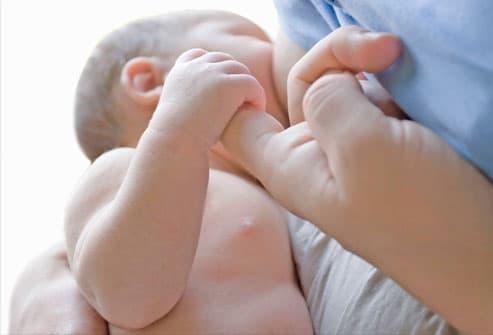Breastfeeding has many health benefits for you and your baby, and it's a special bonding time.
It does take a bit of know-how, so you may have lots of questions. Don't worry if your first experience is less than perfect! A lactation consultant -- and these tips -- can answer some of the most common breastfeeding how-to questions..
Breastfeeding ABCs
- Awareness: Breastfeed whenever your baby seems hungry. Watch for hunger signs like sucking noises, hands moving toward mouth, or the baby turning toward your breast. Crying is considered a late sign.
- Be patient: Babies usually feed for 10 to 20 minutes on each breast.
- Comfort: Prop up your feet, support your arms and head with pillows.
Soothing Sore Nipples
Your nipples may be a little sore at first. To soothe sore nipples, use warm moist compresses, and rub a bit of fresh breast milk on your nipples and et it air dry. Or dab on a bit of lanolin or all purpose nipple ointment made for breastfeeding. A little pain and tenderness is normal. Soreness usually goes away once you find a good breastfeeding position and your baby latches on comfortably. Be sure to see your doctor if soreness increases or lasts several weeks -- sooner if your breast is swollen, red, or you have fever or body aches.
How Often Will Your Baby Nurse?
Newborns should nurse every two to three hours, according to the American Academy of Pediatrics. That's 8 to 12 times in 24 hours. And sometimes a baby may nurse even more frequently.
Your little one may feed from both breasts during one nursing session. And you can switch from side to side. Your baby is full when sucking has slowed or they turn away. After the first month, feedings may start moving back to seven to nine times a day.
Should You Wake Baby to Nurse?
Yes, in the first weeks. Newborns need to nurse about eight times a day, with no more than four hours between feedings. To help your baby wake up, try removing blankets, changing the baby's diaper, massaging the baby softly, or placing your little one against your skin.
Should You Use Both Breasts?
After breastfeeding for a few weeks, start letting your baby drain one breast before switching to the other. The reason? There are two types of milk during each feeding: the thinner, thirst-quenching fore milk, followed by the creamier, fat-rich hind milk. Your baby needs both. If your baby finishes only the first breast during a feeding, offer the other breast at the next feeding.
What's Nipple Confusion?
Nipple confusion occurs when a baby is bottle-fed too soon, and then forgets how to nurse on mom's nipple. It's not very common, but you can easily avoid it. If you're planning on introducing a bottle, wait until your baby is close to 4 weeks old. and try to avoid use of a pacifier. But don't wait too long after that to introduce a bottle or you may have trouble getting the baby to accept one.
Is Baby Drinking Enough?
So long as your baby is gaining about a pound a month, nursing every two to three hours, and has about six to eight wet diapers a day, you can feel sure your little one's eating all they need. Good news: By the second month, some babies no longer need night feedings, and may even sleep through the night.
Are You Suddenly Nursing More?
Babies have growth spurts when you may feel like you're nursing 24/7! Don't worry -- not only will your body produce more milk, but these super-hungry periods are temporary. Growth spurts usually hit around the baby's second week, then again at two, four, and six months. More good news: Most babies are ready to try solid food between four and six months.
Does Your Diet Affect Your Baby?
What you eat affects your breast milk, but usually not as much as most new moms think. Generally you can eat and drink what you like, so long as you're going for a healthy, balanced diet. But steer clear of very spicy or gas-producing foods. And watch for any allergy symptoms in your baby, which should appear in the first four to six weeks. If you're unsure, talk to your baby's doctor.
Can You Smoke or Drink and Breastfeed?
It’s best not to do either. Smoking exposes your baby to nicotine and other toxic chemicals. It can also decrease your milk supply. It’s been shown to raise the risk of SIDS and respiratory allergies. If you need help quitting, talk to your doctor. Alcohol can pass through breast milk, too. That can affect your baby’s development. While the American Academy of Pediatrics says an occasional beer or glass of wine is OK, wait at least 2 hours before nursing. If you do drink, current guidelines say to limit the amount of alcohol consumed in 24 hours to no more than 2 beers, 4 ounces of wine, or 2 ounces of spirits
Bonding Without Breastfeeding
Breastfeeding is just one way to bond with your baby. The connection between parent and child grows every time you hold and cuddle your infant, each time you talk and sing to them, and with every bath and playtime.
Source https://www.webmd.com/










